The story of Astri Group
How Tartu’s best grocer came to be the owner of Estonia’s largest shopping real estate.
The largest retail chain based on Estonian capital. This is what it says in the notes that the founders of AS Astri recently found among their old documents. The idea was jotted down on paper at one of the first team training sessions, where the company, founded in 1991, set its long-term goals.
While not the largest retailer based on Estonian capital, Astri has succeeded in growing into something even more impressive – with its six shopping centres and a market, Astri is the largest Estonian retail real estate group still operating solely on Estonian capital.

Grocer’s as an exhibition hall
In the beginning, it was all about retail. In 1992, Väino Põllumäe and Aleg Kirs bought Veeriku store at an auction in the city of Tartu. After extensive renovations, they opened the first premium-class grocery store in the region in the same premises. The new store had marble floors, a brand new white salesroom and counters filled with goods along with smiling salespeople ready to serve customers. Visitors to the store at the time recall that it was like going to an exhibition, as the people of Tartu, used to the empty shelves of the Soviet era, had never seen such abundance.
From the very beginning, Astri has always been committed to a great customer experience, and Astri’s owners worked hard to deliver a real shopping experience for every customer coming to Veeriku store. The store had its own barbecue, designed to make grilled chicken that was as good as that at Viru Grill, but it was actually even better – sales figures for the super-tasty chickens probably set a record back in the day. The locally made meringues, salads, whipped cream and curd cakes, freshly baked pies and the abundant flower section drew in people from the other side of the city and beyond.
Even at midnight, given that the Veeriku store was open around the clock. In retrospect, the founders of Veeriku store feel they took a crazy step in keeping the shop open around the clock, but it paid off – to everyone’s surprise, the store was packed even at night! A year later, Veeriku Grill bar was opened on the second floor of the store, which was also well received by the people of Tartu.
Veeriku was not only popular with customers, it was also respected as an employer. Owners recall that as many as 300 people once applied for the position of a salesperson.
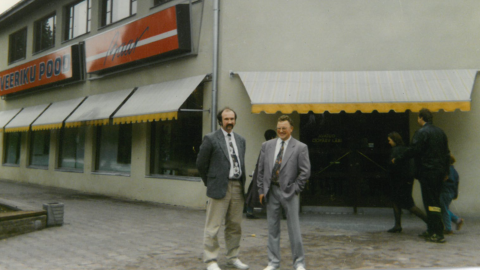
Expanding reach and number of owners
Before opening Veeriku, neither Kirs nor Põllumäe had any experience operating a grocery store, but Veeriku’s success proved that if you put your heart and soul into something, success will soon follow. The men realised that the same approach should be applied elsewhere, and so decided to buy Kivilinna store in Annelinn city district to turn it into Tartu’s first supermarket with elements of shopping centres – it featured a pharmacy, florist and other services all under the same roof as the grocery store. To complete the deal, Astri’s list of owners was extended to include the brothers Paul-Toomas and Ülo Hage.
Despite knowing the Hage brothers from before, it wasn’t before working on the Kivilinna centre that Kirs and Põllumäe quickly realised that their shared views made for a good team. Together they decided to look beyond Tartu.
“In 1996, we were faced with a dilemma: should we go to Tallinn or to choose Narva instead?” recalled Väino Põllumäe in an interview with the newspaper Äripäev, “We decided to go to Narva and it was the right decision.”
In the same year, Astri Group established a foothold in the border town by purchasing the Narva store, and continues to have a strong presence in the city. Over the past 25 years, no less than three Astri-owned centres have provided shopping and entertainment options for Narva residents: Astri Centre, Tempo Centre and Fama Centre, of which Tempo Centre, the second to open, has now been sold.
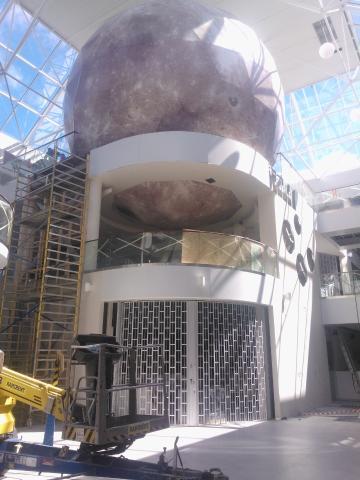
In 1997, when Astri shopping centre, seen as innovative for its time, first started operating in the former premises of the Narva store, it immediately became just as popular among Narva residents as Veeriku had been in Tartu. They were able to surprise customers in the border city with a shopping experience unlike any other store in Narva at the time. In addition to the grocery store with its wide selection, the Centre also included the stores Sportland and Seppälä.
By 2000, Astri owned six retail stores selling groceries and convenience goods: Veeriku, Ülenurme, Saare, Kivilinna and Narva stores, and the Hansa Centre deli and bakery. However, the owners saw the future of the company in the development and management of retail real estate and decided to fully devote themselves to this goal. Astri sold its grocery stores to the then Estonian Consumers’ Association and started planning the largest shopping centre in Southern Estonia.
A real megamall in the middle of a field along with other crazy ideas
It was a daring decision – to build a shopping centre on a field on the outskirts of Tartu with no surrounding residential buildings and infrequent public transport connections. But the owners of Astri had visited similar centres abroad and believed that people in Southern Estonian would find their way to a similar suburban megamall.
On 30 August 2001, Lõunakeskus opened its doors. The men’s instincts proved right – the Riga road hub brought so many visitors to the Centre that the owners started to plan an expansion soon after opening. Today, on the 20th anniversary of Lõunakeskus, we can say that this became the first in a long line of expansions - what was originally a 15,000 m2 shopping centre has now grown into a 95,000 m2 shopping and entertainment park after a total of 13 expansions.
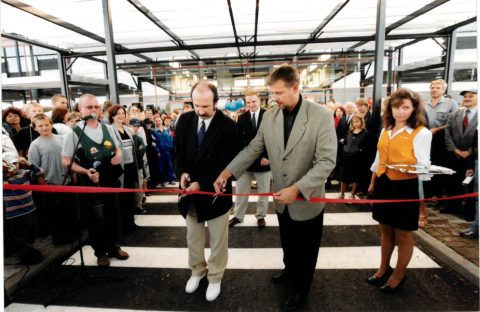
Operating Veeriku store around the clock and building a shopping centre in a field have certainly not been the only ideas that onlookers have voiced doubts about. Even in 2006, when the bootleg video cassette business was booming and Hollywood hits were watched from the comfort of one’s home, the decision to build a modern cinema in the new part of Narva Astri Centre raised quite a few eyebrows. All the more so as there was no cinema in any of the shopping centres in Estonia at the time. And again the instincts of the people working for Astri proved to be right – the multiplex cinema with three theatres brought people out of their homes to enjoy films with high-quality image and sound. Astri also applied the successful cinema and shopping centre combo in Pärnu, when it opened a cinema in the extension to Pärnu Centre, which it bought in 2012.
Another crazy idea was to build an ice rink, the Astri Arena, inside Lõunakeskus. The idea was seen as utopian at first, but it came true in spite of everything. Today, it is a powerful competitive advantage that is difficult to replicate and without which no one would even imagine Lõunakeskus. In addition to providing fun on skates, the ice rink is a great arena for a wide variety of sports competitions, exhibitions, fairs, concerts and more. In 2016 the full-size ice rink suitable for formal competitions was supplemented with a smaller training hall.
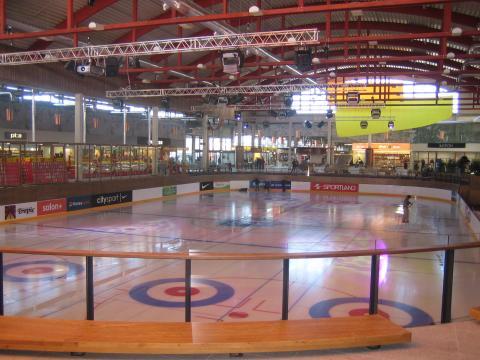
The formula for success: consensual decisions, fresh ideas and the right people
Lõunakeskus, or rather its furious expansion, includes one of the few decisions that the people of Astri would rather change in retrospect. Because the executive management takes all plans under careful consideration and makes decisions by consensus, they have never had to regret a single decision in the company’s history. However, they are prepared to admit that they might have been a little bolder when buying the plot on which Lõunakeskus was built since they have had to buy more land several times later on to realise their expansion plans. The decision not to buy Krediidipank is viewed with similar emotion. Who knows, perhaps we would be talking about a very different Astri Group altogether if a different decision had been made.
At the same time, there have been projects that owners have been happy to abandon in hindsight. One such example is the Raadimõisa Centre in Tartu. A lot of preparations went into planning the centre, but the project never launched due to the 2008 depression.
Owners believe that consensus decisions are what have brought success to Astri Group and kept the owners united. If one of the owners has clear objections to a particular project, or they are not 100% convinced that it is worth investing time and money in the project, the group will not take things forward.
Thorough planning and the confidence of owners alone is not enough for any project to succeed. You also need an excellent manager to drive the project and keep it alive. Finding the right people is crucial, and the owners of Astri are delighted to have found them. To mention just a few names, there would be no Lõunakeskus without Jaan Lott and no Balti Jaama Turg without the late Andres Rjabov as we know them today.
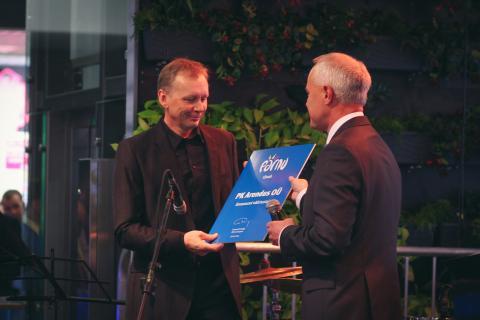
The Astri people also agree that projects cannot be measured in terms of quick immediate returns. Together, the group is building the future – steps taken today will initially generate indirect returns and materialise years down the line. Many of Astri’s projects were ahead of their time at launch, but have since paid off.
Astri’s owners have one more important thing in common – they all recognise that travelling the world with an open mind and importing the best ideas from around the world to Estonia is vital to the development of the company. Even if some of the ideas you see abroad seem a little too novel at first, they become the new normal in just a few years. Depending on the need, special inspirational trips are undertaken with a larger group or owners travel the world separately. The Astri Group team is a mix of Japanophiles and people who are well-versed in Slavic culture. There is something to learn and take away from each location.
Balti Jaama Turg – a carefully targeted hit
In 2014, when Astri Group finally made a move in Tallinn and bought the legendary Jaama market building, there were many such trips with architects. According to the owners, they visited half the markets in Europe to find a concept that would serve as more than just a place to shop and hang out, but that would also function as a community hub like a real market should. After a long search, Balti Jaama Turg was designed based on London markets, combining the articulation of Camden with the openness of Borough Market.
In order to make the new market a fully functional community centre, architects from KOKO brought in local residents, whose opinion was represented by the Telliskivi Society (Telliskivi Selts MTÜ).
The reconstructions, which started in January 2016, were a challenge for both the designers and the contractors. Account had to be taken of the special features of the historic limestone warehouses under heritage protection, the high underground water level and also the many unexpected features, such as four explosive devices, including two aircraft bombs from World War I. The entire street even had to be closed and people evacuated because of one explosive device. Adding to the complexity was the requirement that trading in the market was not to be interrupted for any period of time. To achieve this, the market was temporarily relocated to the Depoo area next to the market building, which has now become a food and entertainment area organically linked to Balti Jaama Turg.
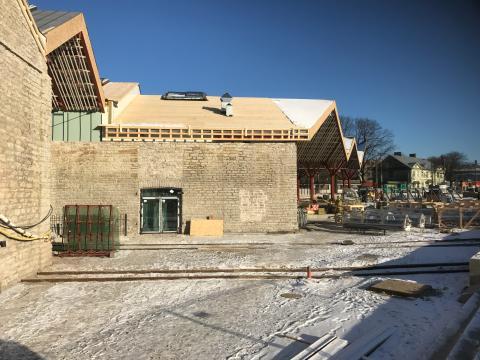
When the new market opened in 2017, it was buzzing from day one. Regulars from the former market and people who had never been to the old, outdated market found their way over. For many people, Balti Jaama Turg sits conveniently on their daily commute and has become their regular stopping and shopping place. People don’t just come here to buy fresh produce, they come to meet friends and enjoy the outdoor terraces of cafés and the two market squares – the Morning and Evening Squares. The market has transformed into a community centre, just as the owners and architects planned.
According to Astri’s leaders, if you love what you do then there is nothing better than to see people enjoying the comfortable living environments you create. We can only wait with excitement to see what Astri Group will come up with for Tallinn Keskturg which the group acquired in 2019 and where construction is expected to start in mid-2022.
Balti Jaama Turg was also warmly welcomed by the architectural community. It was nominated for the prestigious European Union Prize for Contemporary Architecture (the Mies van der Rohe Award) and has won several awards in Estonia.
New and old generation – a synergy of fresh ideas and working solutions
As urban space evolves, so do businesses and their teams. Astri Group has also nurtured a younger generation that has taken on more responsibility over time. Sons and daughters of the original founders have been added to the list of owners, and even in smaller business units teams have welcomed a whole host of young people with fresh and exciting ideas. Older owners admit that young people see things from their own perspective and experience many issues differently than their seniors. Take the digital world, for example, where younger and older generations have completely different user experience and knowledge.
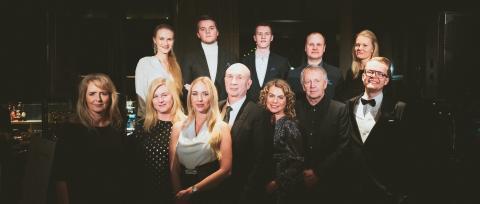
In 2011, the idea of creating an online store for Lõunakeskus was born. However, after an initial analysis, it became clear that the time was not yet ripe for such an e-commerce platform and the project was put on hold for a while. The idea resurfaced in 2015 and a working group was set up to combine the products and services of the businesses operating not only in Lõunakeskus, but in all the other centres operated by Astri Group. The astri.ee site was ready by spring 2016.
There are currently 550 online stores on the Astri platform, 300 of which were added during the 2020 coronal pandemic, when physical stores were closed or had to make do with limited footfall. Setting up your own online store on astri.ee is easy, plus you can rely on the platform team for marketing and customer service support. Most importantly, customers can put items from different sellers in the same basket, saving time and delivery costs. In 2020, Green Astri was introduced to astri.ee, which brings together information on re-use and other eco-themes, lending a hand to anyone who wants to become a more conscious consumer.
Celebrating multiple anniversaries - 30 years since the founding of Astri Group, 25 years since the opening of Narva Astri Centre, 20 years since the opening of Lõunakeskus, 15 years since the opening of Fama Centre and five years since the launch of astri.ee – Astri Group is looking to the future with excitement. There are several major projects underway to carry on doing what Astri does best – creating cosy and functional retail and leisure environments that are great for visitors and commercial lessees alike.
The leaders of Astri Group are delighted to see the group doing so well and that so many like minded people have been involved from the start. They have all played an important and indispensable role in Astri’s success.
Astri Group
Over 27 million visits per year
Over 1,000 stores and services
185,000 m2 of retail space
85 employees in the Group
3,500 jobs across all centres and markets